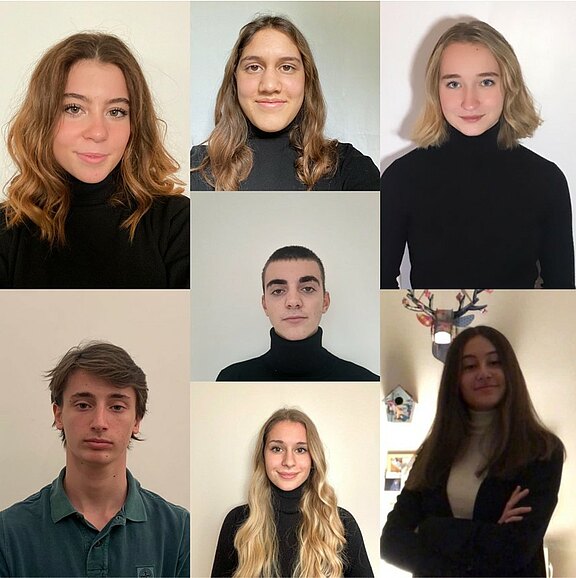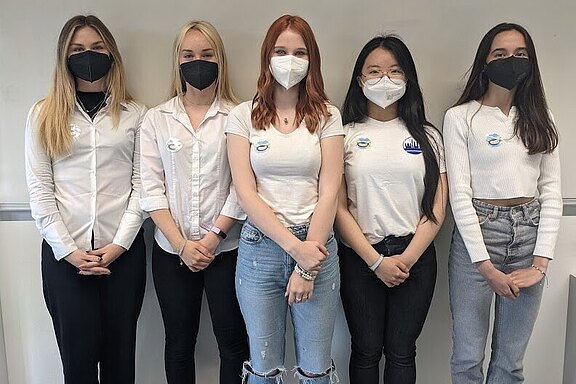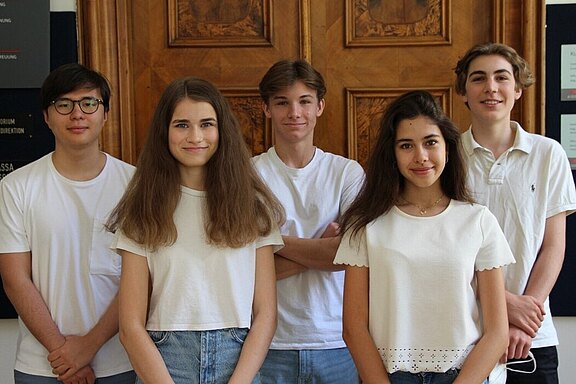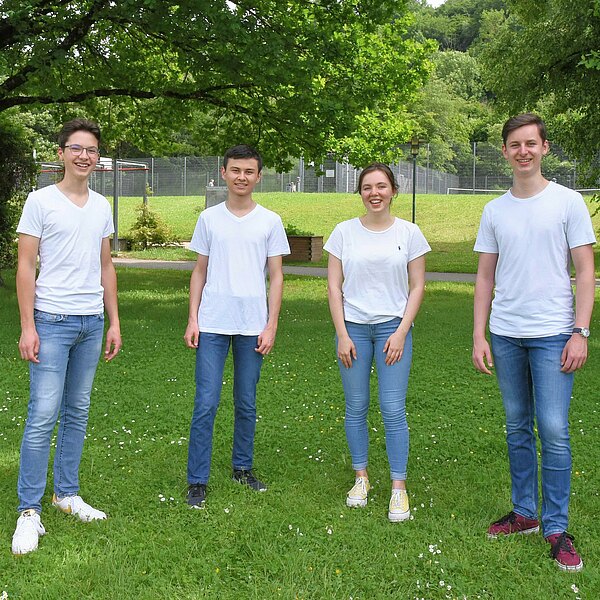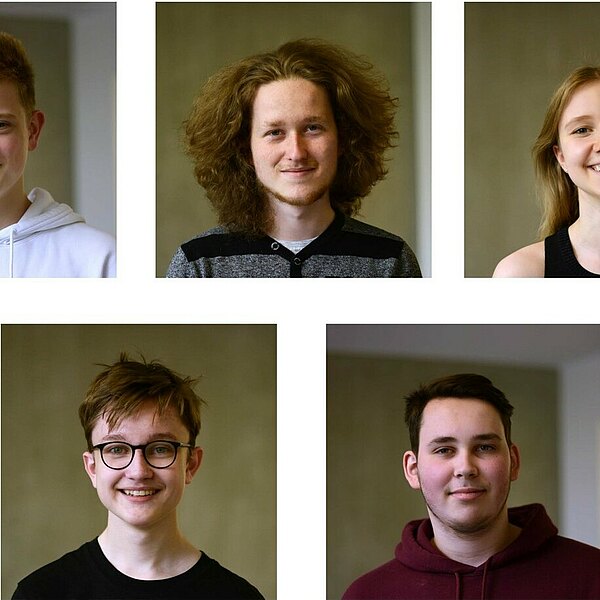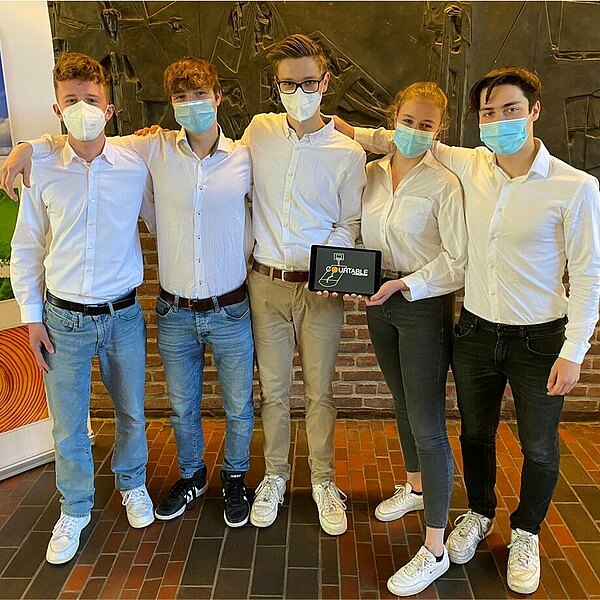Addressing isolation among the elderly: Team from Istituto Zaccaria of Milan takes top honors at International Finals
Zurich, June 15, 2021. Federica (17), Filippo (17), Gaia (17), Giorgia (17), Lucrezia (17), team spokesperson Martina (17), and Riccardo (18) knew from the start that their business idea should have something to do with social responsibility. "My grandmother was always at home during the pandemic, and it was really difficult to help her when she needed somebody to run her errands," Lucrezia explained. "That was the starting point for our idea." ChiAma is a device with which seniors can simply and intuitively communicate with their families, accept offers of assistance from volunteers, and place emergency calls. The aim is to support elderly people with everyday challenges and address isolation. The potential is there: At least 18 percent of Italy's population is age 70 or older—more than in any other European country. At the International Finals of business@school, the educational initiative of the international consulting firm Boston Consulting Group (BCG), the judges selected ChiAma as the winner.
Live presentation shown virtually to an expert panel of judges
Despite school closures and remote learning, over 1,000 senior high school students from around 70 schools proved their initiative by forming teams online and putting together impressive business ideas, including corresponding business plans. They were supported by their teachers and roughly 400 volunteer coaches from over 20 well-known companies and BCG. "We learned how to work effectively in a team. Of course, we argued a lot, but that’s part of the process and helped us grow," said team spokesperson Martina. "We’ve been doing this project for 15 years, but never won the International Finals before," the team's teacher Claudia Nicoletti pointed out proudly, adding "Even with the pandemic, the team did a great job, also because of the support from their coaches from BCG, Matteo Bruno and Bianca Maria Bettoli."
All the teams competing in the business@school International Finals presented their business ideas live in a videoconference and then answered probing questions from the judges. The students' business ideas and well-thought-out business plans highly impressed them. "I participated in business@school many years ago myself, which gave me a big boost, especially when I started working. Outside of regular school classes, the project gives creative young people the tools they need to think like entrepreneurs. It puts them in a position to actually realize innovative ideas and product improvements—which is important even in the age of COVID-19, or better, because of it," emphasized judge Nicolas Albrecht, Chief Business Development Officer at CargoBeamer AG.
The judges were
- Nicolas Albrecht, Chief Business Development Officer, CargoBeamer AG
- Roselien Huisman, founder, Tree AG
- Daniel Kessler, Managing Director and Senior Partner, Boston Consulting Group
- Florian Mauerer, founder, New Tech Ventures
- Gernot Sauerborn, CEO, Sauerborn Management Consulting GmbH
- Dr. Adrian Walti, Chairman of the Board, Neoperl Group
Teams from Rome, Starnberg, and Vienna take second place
In view of the many great ideas, it wasn't easy for the judges to arrive at a decision. Three teams from Rome, Starnberg, and Vienna therefore shared second place.
- Alberto, Edoardo, Elena, team spokesperson Elisabetta, Mihaiela, Sara, and Valentina—all age 17—of Liceo Scientifico Farnesina in Rome (Italy) presented "TasteNoWaste." The device captures what's in the refrigerator, along with the expiration dates, and suggests matching recipes in a corresponding app with the goal of reducing food waste.
- The idea "SecondSmile" from the team of Munich International School in Starnberg (Germany) is an environmentally friendly alternative to standard disposable face masks. Elspeth, Eni, Joey, Kathleen, and team spokesperson Thea (all age 17) outlined their plan for handmade face masks created with fabric remnants and biodegradable elastic bands. To fulfill requirements, the face masks have pockets for filters.
- The Theresianum team from Vienna (Austria)—comprised of team spokesperson Alen (18), Anton (17), Laurenz (16), Sophia (16), and Viola (17)—developed the app "Disport" to enable communication between coaches and athletes. Coaches can use the platform for marketing, while athletes profit from the convenience of booking them.
A total of seven teams with the following ideas took part in the International Finals:
- Döblinger Gymnasium, Vienna, Austria: Sane Soul—a digital psychotherapy platform
- Istituto Zaccaria, Milan, Italy: ChiAma—a device offering services for the elderly
- Liceo Scientifico Farnesina, Rome, Italy: TasteNoWaste—a device for monitoring refrigerator contents
- Munich International School, Starnberg, Germany: SecondSmile—handcrafted face masks made of fabric remnants
- Nehemiah Gateway, Buçimas, Pogradec, Albania: iREACH—a motivational app
- Sir Karl Popper Schule/Wiedner Gymnasium, Vienna, Austria: The Oasis—a café for students
- Theresianum, Vienna, Austria: Disport—an app connecting coaches and athletes
